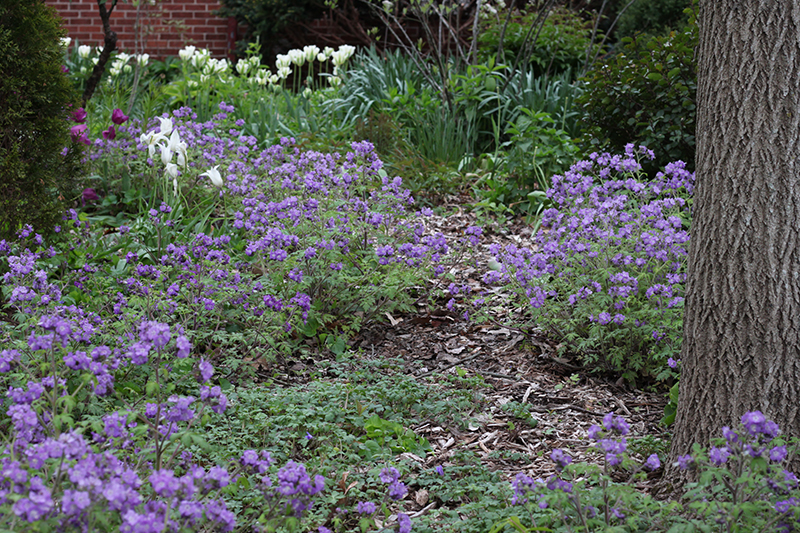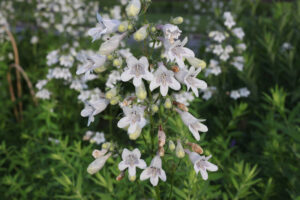Every year, at our chapter’s plant exchange in May, we benefit from, and – I like to think – participate in, the extraordinary liberality of Nature. Annie Dillard, in Pilgrim at Tinker Creek, asserts that “Nature is, above all, profligate.” Nature, in her endeavor to assure the survival of life, routinely produces an abundance of seeds, suckers, rhizomous roots and vining branches, all of them in fierce competition with each other for space, nutrients, sunlight and water. The vast majority of these plant elements never amount to anything; they die long before reaching a state resembling maturity. But if we bring a viable piece of plant into our garden, it has a much better chance at survival. For a garden, by definition, limits competition; someone exercises control over the available resources. To an extent! For Nature still does her profligate thing in our gardens, giving us an abundance of seedlings and suckers to weed out and to share. This, I assume, explains why we love to exchange plants: we can be generous simply by following Nature’s lead. We can give freely, because what we give is free to us. Among the plants in my own garden that beg to be shared, purple phacelia (Phacelia bipinnatifida) ranks first. It’s a biennial flower of our forests that covers the small woodland behind my house with patches of purple carpeting that last for a month or more from mid-April to mid-May. It has moved into the sunnier front yard where it seems to do equally well. I know I shouldn’t just let all those seeds drop to the ground; they might smother everything in sight by next year’s summer. But its survival strategy seems fine-tuned to my infatuation with floral beauty: it gets ready to drop its seeds while it is still flowering. How can I possibly rip out all those phacelias, while they are still busy extending the spring wildflower season in my garden?
Among the plants in my own garden that beg to be shared, purple phacelia (Phacelia bipinnatifida) ranks first. It’s a biennial flower of our forests that covers the small woodland behind my house with patches of purple carpeting that last for a month or more from mid-April to mid-May. It has moved into the sunnier front yard where it seems to do equally well. I know I shouldn’t just let all those seeds drop to the ground; they might smother everything in sight by next year’s summer. But its survival strategy seems fine-tuned to my infatuation with floral beauty: it gets ready to drop its seeds while it is still flowering. How can I possibly rip out all those phacelias, while they are still busy extending the spring wildflower season in my garden? Purple phacelia is best shared in the form of seed during a narrow window in mid- to late May. It is true that the seedlings which emerge in early spring for the following year’s bloom can be transplanted, but since it’s a biennial plant they require some pampering. Not so with some of our other prolific self-seeders: smooth beardtongue, black-eyed susan, aromatic aster. These perennials can be easily dug up when they are small, plunged into their new location, watered once or twice, and left to assert their will to live. Smooth beardtongue is a fairly short-lived perennial, but the other two form persistent and widening clumps in addition to cropping up from seed everywhere in the garden. Our plant exchange thrives on such steady performers in the native plant landscape. But our participants always bring a great variety of plants. Every garden seems to have its own unique over- abundant species to share, so that we can feel bountiful and generous. Beate Popkin
Purple phacelia is best shared in the form of seed during a narrow window in mid- to late May. It is true that the seedlings which emerge in early spring for the following year’s bloom can be transplanted, but since it’s a biennial plant they require some pampering. Not so with some of our other prolific self-seeders: smooth beardtongue, black-eyed susan, aromatic aster. These perennials can be easily dug up when they are small, plunged into their new location, watered once or twice, and left to assert their will to live. Smooth beardtongue is a fairly short-lived perennial, but the other two form persistent and widening clumps in addition to cropping up from seed everywhere in the garden. Our plant exchange thrives on such steady performers in the native plant landscape. But our participants always bring a great variety of plants. Every garden seems to have its own unique over- abundant species to share, so that we can feel bountiful and generous. Beate Popkin
